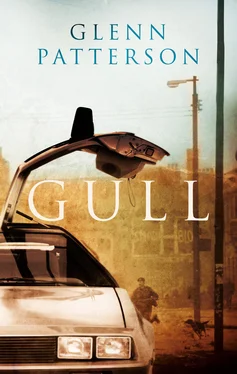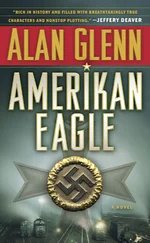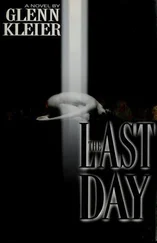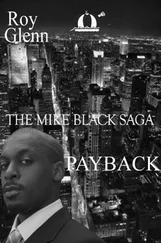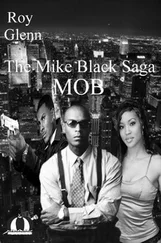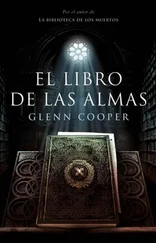Some time around ten he collapsed sideways on the sofa. He woke at three in the morning with — Oh, God — barely enough time to reach the kitchen sink before he threw up. He was sick then, off and on, for the next twenty-four hours. In between times he lay under the bedcovers and shivered. At some point he had a something-more-than-dream: he was in an elevator travelling up and up and up — the numbers above the door made no sense — and then suddenly he was out and he knew for certain this was the forty-third floor, knew it even though he all he could see was bare walls, bare floors, glass and empty sky beyond. He ran from room to room: nothing, nothing, nothing, was or ever had been…
His legs went from under him.
He was on the carpet in the sitting room of Warren House, the bed sheet he had tripped himself up with still tangled round his lower right leg. The vodka bottle was on its side under a low table next to his head. He straightened it up and was surprised to discover it was only a little less than two-thirds full. For the first time it occurred to him that whatever was ailing him did not emanate entirely from that source. Only then was he able to rise above his shame and phone a doctor whose first question — he was sorry to have to ask it — was had he been drinking — not that much and not for the best part of a day now — and whose second was had he been eating — a bit of stale bread, pickles…
The doctor came in person at first light, smelling heavily of pipe smoke, which was to say the least unhelpful. Randall could barely turn his face towards him. He nodded or shook his head weakly to a whole raft of new questions — about work, in the main, but home-life too, who, if anyone, was around to look after him — while the doctor conducted his examination, paying particular attention to the neck, the throat, the underarms and the abdomen.
He put away his stethoscope and took out his pipe, which he began idly to fill. ‘The vomiting needless to say will have drained you and the drinking on an empty stomach was, as any teenager could tell you, asking for trouble.’ (Randall was going to bring up the pickles and the bread then swallowed hard against the thought of bringing them up.) The doctor returned the pipe to his pocket unlit. ‘But I am satisfied there is something else there. Your system, frankly, is in a bit of a mess. You need time away from work.’
Randall found the strength to laugh.
‘I mean right away from everything connected to it. I would be happy to write you a line for a week, a fortnight, however long you think you need. You are no earthly use to anyone like this.’
He left time for his words to sink in.
‘A week, then,’ Randall said at last.
The doctor nodded: that was more like it. He put on a pair of half-moon glasses to write, head tilting back a little more the further he got down the page. ‘Here’ — tearing off the page — ‘I made it for two just in case. If you decide to go back before then they will all think you are a hero.’
In the doorway he turned and looked about the room. ‘I hope you don’t mind me saying, it’s a lovely house and everything, but if you had somewhere else you could be, other people around you, just till you’re on your feet again…’ His expression as he spoke gradually changed: this was as pointless, he had obviously concluded, as recommending a longer sick-line. He drew in breath. ‘I’ll see myself out.’
Randall fell asleep again almost at once, and almost at once was back on the empty forty-third floor, returning there at intervals throughout another fretful night. The following morning he felt well enough to make tea in a mug, which he drank, black of necessity, with three spoonfuls of sugar. By midday he was showered and dressed. Three hours later he was at the airport.
*
The first person he met as he came out of the elevator was Maur Dubin, fur-coated in defiance of the season, and immediately behind Maur a phalanx of uniformly young, uniformly six-foot-plus removal men, toting paintings, pieces of sculpture, sealed cardboard cartons. More cartons lay open on the secretaries’ desks, on the floor all around them; the lobby walls were stripped bare.
It was as though he walked into the movie of his life the scene before the one he had been dreaming. He took a step back, but already the elevator was closing behind him.
‘Hey, there!’ Maur clicked his fingers, to summon the name, it seemed, as much as attract attention. ‘Randall! Hold that door!’
No sooner had he called out than DeLorean’s own voice roared from inside his office. ‘ Randall? Is Edmund here?’
Randall presented himself in the doorway.
DeLorean was standing in the middle of the floor where his desk had used to be, phone in hand. Shirts were strewn about the carpet, some still in their packaging, others unwrapped, arms outstretched, blues and lilacs, plain and striped, white collars and toning. ‘But this is crazy,’ he said, taking the words out of Randall’s mouth. He held the phone at arm’s length, earpiece tilted towards Randall. Far, far, away a ring tone sounded. ‘I was just this minute trying to call you in Belfast. They told me you were sick.’
‘And they told me you weren’t giving up yet.’
DeLorean drew back his head, puzzled, then looked about him. Now he got it. ‘You mean this?’ He laughed. ‘Didn’t you see the memo? We’re not giving up, we’re moving down , to the thirty-fifth floor.’ The thirty-fifth floor — the ‘basement’ in the DeLorean company parlance — had up to now been home to several of the company’s non-executive offices. ‘Doing our bit to help the economy drive.’
‘Excuse me.’ An elderly man slipped into the room through the door behind Randall, suit jacket off to reveal, beneath his vest, a lilac-striped shirt to match one of those spread out on the floor. ‘Anything?’ he asked DeLorean, and Randall at the second time of asking placed the accent, a variant on Jennings’s Scots.
DeLorean glanced apologetically at Randall. ‘I wonder if you could give us a couple of minutes. Mr Simpson here has come all the way from Edinburgh, Scotland… not just for me, you understand, but this is his only afternoon in New York.’
Randall felt his brow furrow. At a time like this he was buying shirts? Imported tailor-made shirts?
Of course he was. No matter how parlous the situation he was still the public face of the company, a face, moreover, whose appearance on the cover of a magazine could generate millions of dollars of desperately needed publicity.
What was he to do, go about in a hair shirt?
‘You don’t have to explain anything,’ Randall said.
DeLorean walked across the floor and embraced him, fists tightening between Randall’s shoulder blades. ‘It’s good to see you,’ he said and Randall could not deny that to be seen by him — to be so warmly welcomed — was good too.
‘I’m not going to pretend that I thought it would ever come to this,’ DeLorean told Randall when he returned next day, rested, back to his old self, as good as, ‘and I am certainly not going to pretend that it is character-forming or any such crap, but we will take what benefit we can from the changes being forced upon us and we will come back stronger than before.’
Later that day, sitting in the new office (Randall thought he looked a little hunched as though the unaccustomed eight floors above him was an actual physical weight), DeLorean told him he had decided, some weeks ago, when it had become inevitable that operations here in Park Lane would have to shrink, to take the opportunity to clear up some of the other… clutter that had accumulated over the years. ‘I believe I may have given the wrong impression about my father in the past, not just to you, to almost anyone I spoke to about him. I may have suggested that he was from Alsace-Lorraine.’ ( I believe I may… I may… Even decluttering had to be approached with circumspection.) ‘He wasn’t, he was from a place called Alba, in Romania, Transylvania, to be precise, which, you can imagine, was part of the problem when I was a kid.’ He raised his hands, making claws of the fingers. ‘Son of Dracula…’ His lips settled again over the teeth he had momentarily bared. ‘You know how other kids are. It was a problem for the old man too, or he got it into his head that it was. He had ambitions as an inventor, you see, making improvements to the tools they used then on the line — I saw them myself, carved out of wood — but he couldn’t get anyone at GM to look at them: no pedigree. I think that’s where Alsace-Lorraine came from.’
Читать дальше
